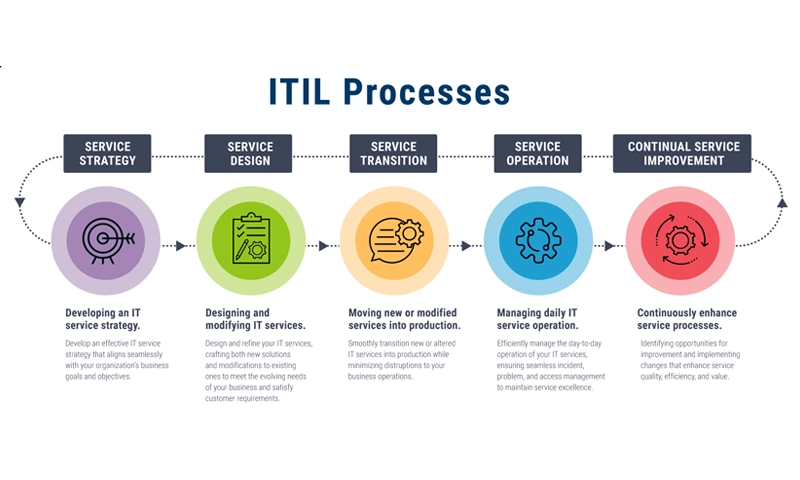
ITIL, or Information Technology Infrastructure Library, is a set of best practices for IT service management (ITSM). It provides a framework to help organizations manage their IT services efficiently and effectively. ITIL focuses on aligning IT services with business needs and includes processes such as incident management, change management, and service level management.
The framework has evolved through several versions, with ITIL 4 being the most recent. ITIL 4 emphasizes a holistic approach to service management, integrating concepts like Agile, DevOps, and Lean practices.
Incident Management
Purpose: To restore normal service operation as quickly as possible and minimize the impact on business operations.
Key Activities:
- Identifying and logging incidents.
- Classifying and prioritizing incidents based on their urgency and impact.
- Diagnosing and resolving incidents.
- Communicating with users about the status of their incidents.
- Closing incidents and ensuring that they are documented.
Change Management
Purpose: To ensure that all changes to IT services are made in a controlled manner, minimizing risk and impact on service quality.
Key Activities:
- Assessing, authorizing, and scheduling changes.
- Implementing changes and ensuring they are documented.
- Reviewing and evaluating the success of changes after implementation.
- Managing the change backlog and ensuring communication with stakeholders.
Service Level Management (SLM)
Purpose: To ensure that IT services are delivered in accordance with agreed-upon service levels and to continually improve service delivery.
Key Activities:
- Defining, negotiating, and documenting Service Level Agreements (SLAs).
- Monitoring and reporting on service performance against SLAs.
- Conducting regular reviews and service level assessments.
- Identifying opportunities for improvement in service delivery.
Each of these processes plays a critical role in ensuring that IT services meet business needs and operate smoothly.
ITIL 4 indeed emphasizes a holistic and integrated approach to service management. Here’s a deeper look at how it incorporates Agile, DevOps, and Lean practices:
Holistic Approach in ITIL 4
- Service Value System (SVS):
- ITIL 4 introduces the Service Value System, which ensures that all components and activities of an organization work together to create value through IT services.
- The SVS includes guiding principles, governance, service value chain, practices, and continual improvement.
- Four Dimensions Model:
- ITIL 4 recognizes that effective service management requires a balanced consideration of four dimensions:
- Organizations and People: The roles, responsibilities, and organizational structures that support service management.
- Information and Technology: The tools and technologies used to support service delivery and management.
- Partners and Suppliers: The external organizations that contribute to service delivery.
- Value Streams and Processes: The workflows and practices that create value for customers.
- ITIL 4 recognizes that effective service management requires a balanced consideration of four dimensions:
Integration of Agile, DevOps, and Lean
- Agile:
- Responsive Practices: ITIL 4 encourages iterative approaches, promoting adaptability and responsiveness to changing business needs.
- Customer Collaboration: Emphasizes working closely with stakeholders to ensure services meet user expectations.
- DevOps:
- Shared Responsibility: ITIL 4 promotes a culture of collaboration between development and operations, which is essential for improving service reliability and delivery speed.
- Automation: Encourages the use of automation to streamline processes, particularly in incident resolution and change management.
- Lean:
- Efficiency Focus: ITIL 4 integrates Lean principles to eliminate waste and enhance efficiency in service delivery processes.
- Continuous Improvement: Lean’s focus on ongoing improvement aligns with ITIL’s emphasis on refining practices based on performance metrics and feedback.
Benefits of This Integration
- Enhanced Agility and Flexibility: Organizations can adapt to changes more quickly.
- Improved Collaboration: Cross-functional teams work more effectively together.
- Higher Quality Services: Continuous feedback loops and improvements lead to better service outcomes.
- Value-Driven Approach: Emphasizes delivering value to customers and stakeholders at every stage.
By integrating these concepts, ITIL 4 helps organizations create a more adaptable, collaborative, and efficient service management framework that aligns closely with modern business needs.